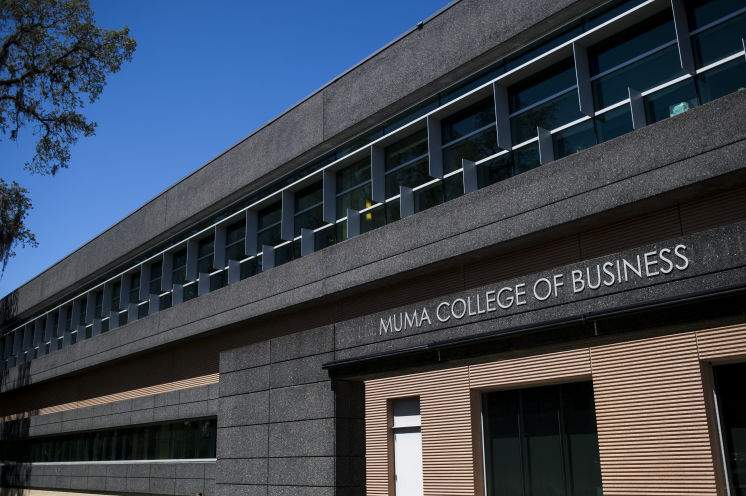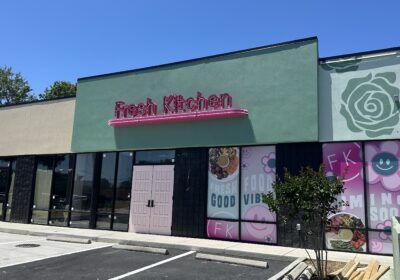Muma College of Business offers 8,000 participants free certificate program

In a time of apprehension and ambiguity for many individuals, businesses and institutions, the Muma College of Business has created and offered a course to earn a collegiate-level certificate — and at no cost.
The Post-Crisis Leadership Certificate will be given through a course that consists of seven modules instructed by 18 of the college’s faculty members who have volunteered to facilitate the course.
The program will last from May 20 to July 1 with two-hourlong live lectures on Wednesdays from 6-8 p.m. by College of Business faculty. It will help students learn to use “immediate action” to grow a business, gain a competitive advantage and position a company for future success, according to the Post-Crisis Leadership Certificate homepage.
DCE Productions — a Tampa-based production company — is the other hand in the ability to provide the course at no cost. It is a “full service audio-visual production and creative solutions provider,” according to its website, and has donated its platform and resources in order to administer the course.
The college was connected to DCE through Andy Hafer, founder of DCE and a current student in the DBA program.
“[DCE] already had everything in place for this, and so because the capacity that they’ve had on their platform, we’re able to have over 4,000 participants for this,” said Loran Jarrett, an instructor at the College of Business and leading faculty member in the course’s development.
“If you think of using Teams or Zoom or anything like that, it really wouldn’t have the capacity so it’s because of DCE and this platform that they have that we’re able to expand it to the community to the level that we are.”
CEO of DCE Paul Harris has also been hands-on in developing and creating the platform for the course, according to Jarrett.
The idea for this course began with Dean of the College of Business Moez Limayem.
“[Limayem] is very in tune with the local business community, so he kind of got the ball rolling on this,” said Jarrett. “He actually personally called every single faculty member who is volunteering to assist with this.”
As of May 9, 3,619 people have enrolled in the course. When enrollment for the program launched May 6 at 5:10 p.m., over 500 people enrolled within the first 40 minutes and over 1,150 people were enrolled by midnight.
“We had to expand the capacity because, obviously we want to help as many people as possible, but we just didn’t realize the demand and level of excitement that people had toward this was there,” said Jarrett.
The capacity for the course is now at 8,000 participants. There are no requirements to register for the course, and since it is entirely online, it’s reached beyond the Tampa Bay community.
In fact, the College of Business announced May 13 that the program filled its capacity and had to create a waitlist for the rest of those interested in participating.
“We did this wanting to help Tampa Bay, simply because — Tampa, Sarasota, St. Pete, the local community — because they have given the university and the College of Business so much, and they’ve been so supportive,” said Jarrett. “It was kind of our way of giving back.
“But without the boundaries of location, it’s really interesting to see how interested people are globally.”
As of May 9, there are participants from 45 different states in the U.S. and 56 different countries. Of these registered participants, 76 percent are currently employed and 27 percent were laid off or furloughed, according to Jarrett.
The course will be delivered “synchronously,” meaning the instruction will be live and at specific times. It will cover a range of material inspired by the current issues that businesses are facing due to COVID-19.
Associate professor Dr. Dirk Libaers is among the college’s faculty members who have also led the development of the program and will be one of its instructors.
“[The course] covers all the disciplines that are present within Muma, and that is focused on real-world practice that is useful during times of economic and social upheaval,” Libaers said in an email to The Oracle. “It is taught by both academics and practitioners.”
Dr. Matt Mullarkey, instructor at the College of Business and another key developer of the course, agreed with Libaers that the course material will round out students’ leadership skills in a new reality.
“We asked our professors to ‘hand select’ the topics and materials that would best offer business leaders insights and understanding of how to lead and manage in the new normal we all face,” Mullarkey said in an email to The Oracle.
The program is labeled with the term “post-crisis” instead of “pandemic” or other COVID-19-related branding for that reason, according to Jarrett. The College of Business wants the curriculum to be applicable in all kinds of emergency situations that businesses may face.
“This is not the first time that there has been some kind of financial crisis, so we’re trying to make the lessons that we are teaching applicable in multiple scenarios,” said Jarrett.
One of the course’s participants — Jesse Schietz, a recently graduated USF student — saidhe learned about the course through an email from the college, but doesn’t know what to expect from it yet.
“I wanted to make myself stand out during these times,” said Schietz about his incentive to enroll in the course.
Students will have to pass quizzes on the course material as well as attend the virtual instruction to receive the certificate.
“We are an accredited university and we do want this course to be taken seriously,” said Jarrett. “People are earning a certificate, so we want that to have value.”
The College of Business plans to continue offering this course in the future for the community as it has already proven itself popular by the enrollment numbers before it has even begun.
With the first run of the course though, the college wants to focus on lending a helping hand.
“The goal really is to give back to the community,” said Jarrett. “The community has been so wonderful to us, and our business partners are in distress — they need help — they’re laying people off, they’re trying to figure out what to do, they’re in these unprecedented times and we can offer information, education and research.
“It’s just our way of trying to help.”






